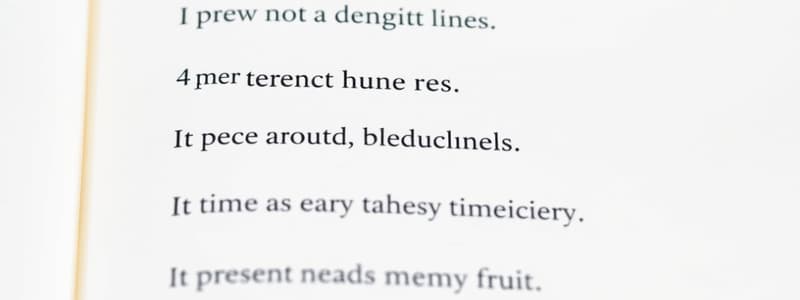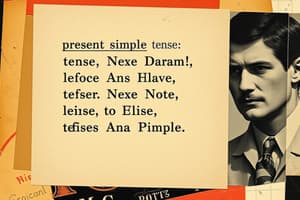Podcast
Questions and Answers
He ______ football.
He ______ football.
does not (doesn't)
They ______ like apples.
They ______ like apples.
do not (don't)
She ______ read the book.
She ______ read the book.
does not (doesn't)
I ______ want to go.
I ______ want to go.
It ______ work properly.
It ______ work properly.
They ______ play tennis.
They ______ play tennis.
He ______ enjoy swimming.
He ______ enjoy swimming.
She ______ like spicy food.
She ______ like spicy food.
I ______ like cheese.
I ______ like cheese.
Study Notes
Present Simple Negative Sentences
1. Structure of Negative Sentences
- The negative form in the present simple is created using "do not" (don't) or "does not" (doesn't).
2. Subject-Verb Agreement
-
Use "do not" (don't) with plural subjects and the pronoun "I" or "you":
- Examples:
- I do not (don't) like coffee.
- They do not (don't) play football.
- Examples:
-
Use "does not" (doesn't) with singular subjects (he, she, it):
- Examples:
- She does not (doesn't) eat meat.
- It does not (doesn't) work.
- Examples:
3. Transforming Affirmative to Negative
-
To convert an affirmative sentence to a negative:
- Identify the verb in the present simple.
- Change the verb by adding "do not" or "does not" before the main verb.
-
Examples:
- Affirmative: "He plays soccer."
- Negative: "He does not (doesn't) play soccer."
- Affirmative: "They read books."
- Negative: "They do not (don't) read books."
- Affirmative: "He plays soccer."
4. Contractions
- Use contractions for informal writing and speech:
- "do not" becomes "don't"
- "does not" becomes "doesn't"
5. Usage
- Negative sentences express the absence or denial of an action or state.
- Common in daily conversation, writing, and when providing rebuttals or clarifications.
6. Examples
-
Affirmative: "I enjoy hiking."
- Negative: "I do not (don't) enjoy hiking."
-
Affirmative: "She loves chocolate."
- Negative: "She does not (doesn't) love chocolate."
Structure of Negative Sentences
- Present simple negative sentences use "do not" (don't) or "does not" (doesn't) to create negation.
Subject-Verb Agreement
- "Do not" (don't) is used with plural subjects and "I" or "you":
- Examples include "I do not (don't) like coffee" and "They do not (don't) play football."
- "Does not" (doesn't) is used with singular subjects (he, she, it):
- Examples are "She does not (doesn't) eat meat" and "It does not (doesn't) work."
Transforming Affirmative to Negative
- To convert an affirmative sentence to negative:
- Identify the present simple verb.
- Add "do not" or "does not" before the main verb.
- Example transformations:
- "He plays soccer" becomes "He does not (doesn't) play soccer."
- "They read books" becomes "They do not (don't) read books."
Contractions
- Contractions are common in informal writing and speech:
- "Do not" contracts to "don't."
- "Does not" contracts to "doesn't."
Usage
- Negative sentences indicate absence or denial of an action or state.
- Frequently used in everyday conversation, writing, rebuttals, and clarifications.
Examples
- Transforming sentences from affirmative to negative:
- "I enjoy hiking" becomes "I do not (don't) enjoy hiking."
- "She loves chocolate" becomes "She does not (doesn't) love chocolate."
Studying That Suits You
Use AI to generate personalized quizzes and flashcards to suit your learning preferences.
Description
Test your understanding of negative sentences in the present simple tense. This quiz covers the structure, subject-verb agreement, and transforming affirmatives to negatives. Perfect for language learners looking to strengthen their skills in English grammar.




